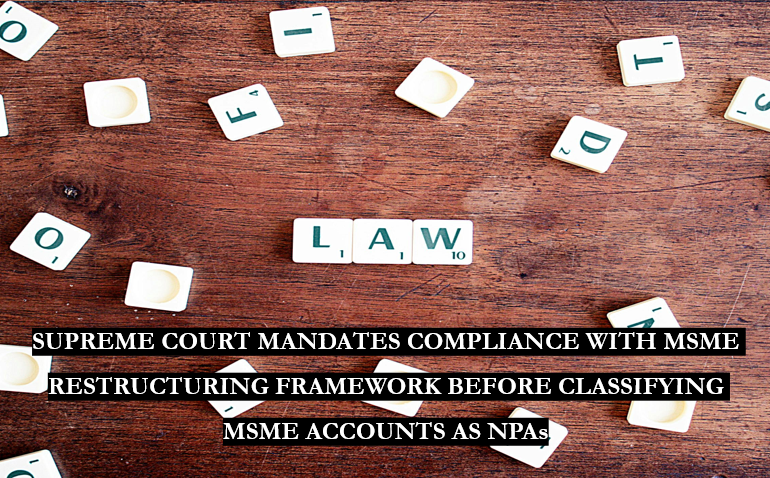SUPREME COURT MANDATES COMPLIANCE WITH MSME RESTRUCTURING FRAMEWORK BEFORE CLASSIFYING MSME ACCOUNTS AS NPAs
Introduction
A two- Judge Bench of the Supreme Court comprising of Justice Bela M. Trivedi and Justice R. Mahadevan passed an Order dated 01.08.2024 in Civil Appeal No 8332 Of 2024 (@ Special Leave Petition (C) No. 7898 Of 2024) and 5 other Appeals and held that banks and Non-Banking Financial Companies (NBFCs) must comply with the statutory restructuring framework outlined in the 2015 Notification[1] issued under the Micro, Small and Medium Enterprises Development Act, 2006 (MSMED Act)before classifying MSME accounts as NPAs.
Background of the Case
The Appellants, several companies, classified as MSMEs under the (MSMED Act) contested the actions of banks and Non-Banking Financial Companies (NBFCs) that classified their loan accounts as Non-Performing Assets (NPA). The root of the dispute revolved around a Notification issued on 29.05.2015, by the Central Government under Section 9 of the MSMED Act (Measures for promotion and development). This Notification introduced a “Framework for Revival and Rehabilitation of MSMEs,” which required banks to identify incipient stress [2] in MSME accounts and explore options for resolution before classifying them as NPAs.
Appellants’ Contentions
The Appellants argued that the Respondents failed to comply with the mandatory restructuring guidelines outlined in the 2015 Notification. They asserted that the Notification was binding and that banks and NBFCs were required to identify early signs of incipient stress in MSME accounts and follow a structured process to resolve it. The Appellants maintained that without adhering to this framework, the classification of their accounts as NPAs was unlawful.
Respondents’ Arguments
On the other hand, the Respondents contended that the 2015 Notification’s guidelines were not mandatory and did not possess statutory force. They argued that the provisions of the Securitisation and Reconstruction of Financial Assets and Enforcement of Security Interest Act, 2002 (SARFAESI Act), which empowers banks to recover dues by auctioning properties, took precedence over the MSMED Act. Furthermore, the Respondents highlighted that since the Appellants had not applied for restructuring under the Notification, the banks were justified in classifying the accounts as NPAs.
High Court’s Decision
The High Court of Judicature at Bombay on 11.01.2024 dismissed the Writ Petitions (L) No. 20100 of 2023 and others filed by the MSMEs. It ruled that banks and NBFCs were not obligated to adopt the restructuring process without applications from the MSMEs. The High Court did not express any opinion on the merits of the individual cases and left it open for the Appellants to seek alternative remedies under the law. The decision was based on the interpretation that the SARFAESI Act overrides the MSMED Act.
Supreme Court’s Judgment
The Supreme Court while deciding the matter consolidated several appeals. The Apex Court observed that the very object and purpose of the MSMED Act was to provide for facilitating the promotion and development and enhancing the competitiveness of Micro, Small and Medium Enterprises and for matters connected therewith and incidental thereto. The Court observed that the Notification issued under Section 9 of the MSMED Act was indeed mandatory and binding for all banking companies. It emphasized that the objective of the Notification was to identify incipient stress in MSME accounts and explore resolution options to support the MSMEs.
The Supreme Court noted that the banks’ failure to comply with these statutory instructions rendered their subsequent actions under the SARFAESI Act illegal and void.
Conclusion
The Supreme Court’s decision reaffirms the statutory nature of the 2015 Notification and mandates compliance by banks and financial institutions. The Court further highlighted the necessity of following due processes to support MSMEs before classifying their accounts as NPAs. The Supreme Court further, set aside the Order dated 11.01.2024 of the High Court, however the Court stated that as the High Court had not dealt with other issues based on factual aspects in the writ petitions, the Apex Court left it open for the Appellants to take a recourse to any remedy as may be legally available to them for agitating the issues not decided by the High Court.
Kartik Khandekar
Senior Associate
The Indian Lawyer & Allied Services
[1] https://msme.gov.in/sites/default/files/Notification_English.pdf
[2] Incipient stress indicates that a loan account is exhibiting early signs of potential default on debt obligations, even though it has not yet been categorized as a non-performing asset (NPA).





































Leave a Reply